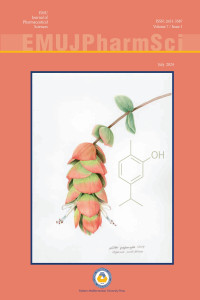Issue Editorial Board
Aim & Scope
EMU Journal of Pharmaceutical Sciences (EMUJPharmSci), which is an open access peer-reviewed journal, publishes original research, short reports and review articles. The contributions to the journal must be written in English. The journal has been published regularly three times a year since 2018.
The journal covers the research on all aspects of Pharmacy presented as original articles, short reports and reviews. In our journal, publications are the recent studies on the basis of Pharmaceutical Sciences including, Pharmaceutical Toxicology, Pharmaceutical Chemistry, Pharmacognosy, Pharmaceutical Botany, Pharmaceutical Technology, Pharmaceutical Biotechnology, Pharmaceutical Microbiology, Pharmacology and also other topics related with the pharmaceutical area.
Writing Rules
- Contributions to EMU Journal of Pharmaceutical Sciences must be in English.
- All manuscripts are subject to editorial review.
- The manuscripts should not be previously published or accepted for publication and should not be submitted or under simultaneous consideration for publication elsewhere.
- The manuscripts are published in the order of final acceptance after review and revision.
- If the manuscript is returned to authors for revision and the revised manuscript is not received by the editor within 2 months it will be treated as a new article.
- If the manuscript is accepted and the proof is returned to the authors, corrected proofs should be sent to the editor within 5 days.
- The original manuscript must be arranged as follows: Title page (including the title, authors and correspondence address), abstract, key words, introduction, materials and methods, results and discussion, acknowledgements and references.
- The reviews must be arranged as follows: Title page (including the title, authors and correspondence address), abstract, introduction, discussion, acknowledgements and references.
- Please ensure that every reference cited in the text is also present in the reference list (and vice versa).
- Unpublished results and personal communications are not recommended in the reference list.
- References in the text should be cited as: the author(s) surname and the publication date.
- The list of references should be single-spaced.
- List the references in alphabetical order under section of “references”.
- For references up to 5 authors, write the names of all authors.
- For references more than 5 authors, write the names of the first 5 and add et. al.
- The title of journal should be abbreviated in italics according to the style used in the National Library of Medicine’s Journals in NCBI Databases.
- Volume numbers should be indicated in bold letters.
- Use figures and tables when information cannot easily be stated or summarized in the manuscript itself.
- All the figures and tables must be referred to in the main body of the text.
- Tables and Figures should be numbered consequently in the order of appearance within the text, referred as “Table 1” and “Figure 1”.
- Descriptive titles should be given at the top of the tables and at the bottom of the figures.
- Figures should be prepared with the highest resolution and should be provided as a separate page following references.
- Full E-mail address, full postal address, telephone and fax number of the corresponding author.
- All necessary files have been uploaded.
- References are in the correct format for this journal.
- All references mentioned in the Reference list are cited in the text.
- All figure captions.
- All tables (including title, description, footnotes).
- For any further information please e-mail:
Ethical Principles and Publication Policy
EMU Journal of Pharmaceutical Sciences (EMUJPharmSci), which is an open access peer-reviewed journal, publishes original research and review articles. The contributions to the journal must be written in English. The journal has been published regularly thrice a year since 2019.
The journal covers the research on all aspects of Pharmacy presented as original articles, short reports and reviews. In our journal, publications are the recent studies on the basis of Pharmaceutical Sciences including, Pharmaceutical Toxicology, Pharmaceutical Chemistry, Pharmacognosy, Pharmaceutical Botany, Pharmaceutical Technology, Pharmaceutical Biotechnology, Pharmaceutical Microbiology, Pharmacology and also other topics related with the pharmaceutical area.
All manuscripts are subject to peer review and if required, ethics committee reports or an equivalent official document will be requested from the authors. For the manuscripts concerning studies on humans, a statement will be requested from the authors that shows the informed consent of patients which informs the volunteers with a detailed explanation of the procedures that they may undergo. Additionally, an official approval must be obtained, if the study is to be carried out in any institution or organization.
All submissions will be screened by a similarity detection software (iThenticate) during the peer-review. Authors must cite the materials correctly for each discussion of previous works of others or own.
In the event of alleged or suspected research misconduct, the Editorial Board will follow and act in the accordance with the journal guidelines.
Price Policy
All expenses of the journal are covered by the Eastern Mediterranean University. Processing and publication are free of charge with the journal. There is no article processing charges or submission fees for any submitted or accepted articles.

